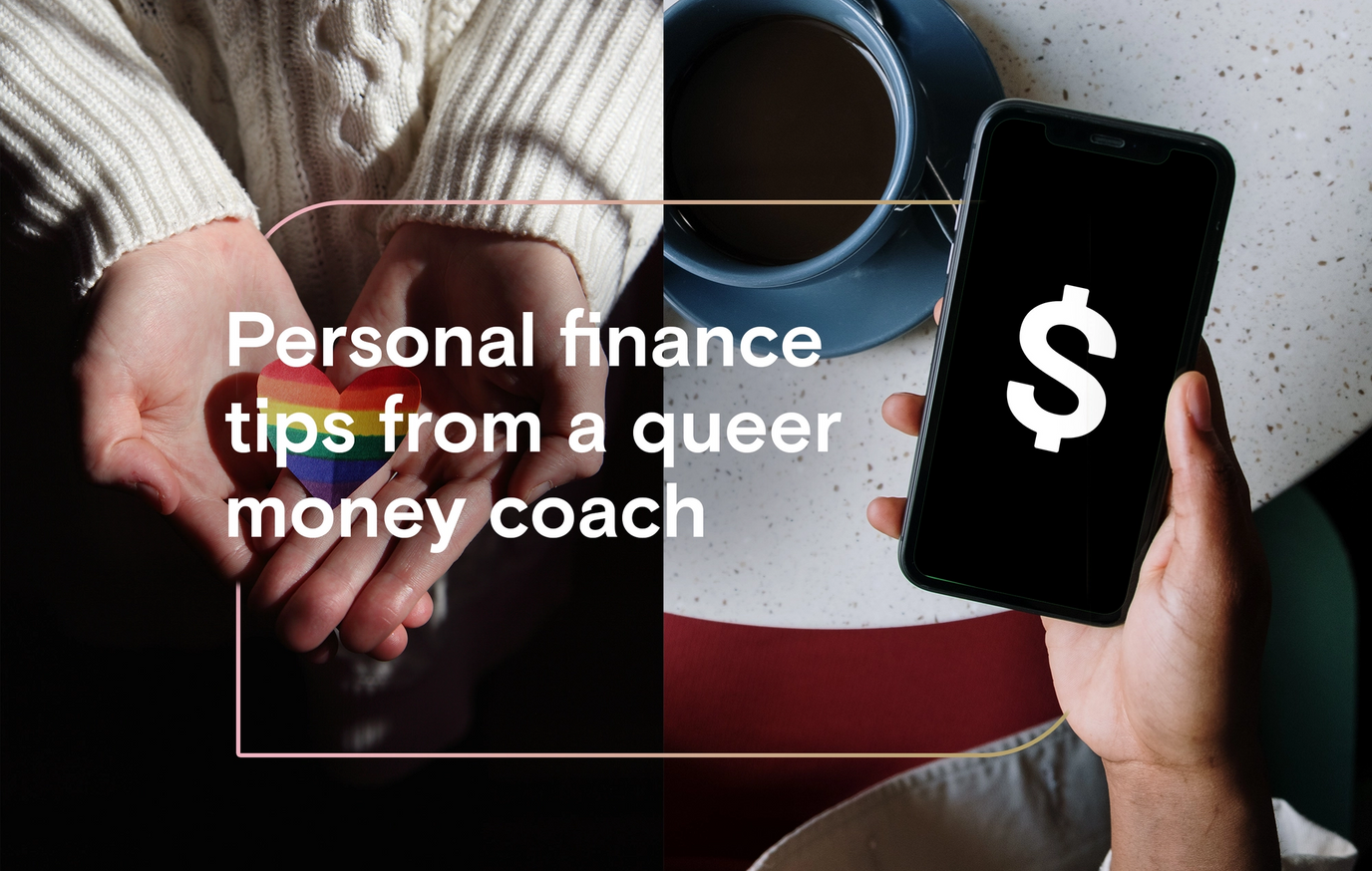Back to learn
Personal finance tips from a queer money coach

Written By
Rounding it up
The LGBTQ+ community faces unique challenges in the financial space. For example, it may be difficult to find safe spaces free of discrimination.
Fortunately, there are steps individuals can start taking to overcome these barriers, and Ellyce is here to share some of them.
It always helps to find a financial advisor, coach, or educator who you trust, particularly those who speak directly to the community.
You can also up your financial literacy game with resources designed for the LGBTQ+ community. This will help you better manage your money and build a strong financial future.
June marks Pride Month, a time of celebration for the LGBTQ+ community. It’s also a time to highlight the discrepancies that still exist for the LGBTQ+ community, including in the financial space. According to a 2018 survey, 62% of LGBTQ+ folks felt they faced financial problems due to their sexual identity. As a queer money coach, I have experienced these firsthand, and want to share some tips on how we can all attain financial stability and literacy, regardless of our identity.
Financial challenges for the LGBTQ+ community
Before we cover how to build a strong financial foundation, it’s important we dive into the unique challenges the LGBTQ+ community faces. Some of the most notable barriers for this community include:
Safe spaces — Finding spaces free of discrimination or judgement can be challenging for the LQBTQ+ community. It’s so important to find a safe space where you can talk openly about your financial struggles and plans for the future. In addition, available information is often generic and not catered to the community.
Access to housing — Housing discrimination is still a prevalent issue in the LQBTQ+ community. In fact, 11% reported higher housing costs due to this bias. The community also faces prejudice that impacts their credit, and credit scores are crucial when purchasing or renting a home. Additionally, the LQBTQ+ community may face struggles at home, which could force individuals to live on their own before they are financially stable.
Higher rates of mental illness — LGBTQ+ folks face higher levels of mental illness, which contribute to financial challenges. Firstly, the cost of medication and treatment some folks require can be high, and is often not covered by insurance, which can lead to a large monthly expense. Secondly, the way that neurodivergent people view, understand, and spend money is very different from neurotypical people. Mental illness can cause impulsiveness, overstimulation, under stimulation, anxiety, sadness, dissociation, and more — all of which can impact your financial decision making.
Fear of identity — Only in recent years is it becoming safer to be openly gay. Unfortunately, many people still do not have a safe environment in which they can be their authentic selves. There are often feelings of shame that can spill over into financial behaviour and result in coping mechanisms such as impulse spending.
6 tips to improve your financial future
No matter where you are on your financial journey, there are steps you can start taking today to improve your financial future. You can begin to overcome these issues by finding safe spaces, becoming more financially literate, and understanding and adjusting your spending habits.
1. Find a financial advisor, coach, or educator who you trust
There’s a lot of financial information out there and sometimes, it can get overwhelming. So it helps to navigate these waters alongside someone who aligns with your values. How do you find this magical someone? The first step is making sure that they have your best interest in mind. Keep your eye out for red flags when searching for a financial advisor. Next, you want to make sure that they are welcoming and supportive of the LGBTQ+ community. A great way to do this is by directly seeking out financial educators specifically speaking to the community. Don’t be afraid to interview several people to find someone who is the best fit for you.
2. Become more financially literate
Financial literacy is the ability to understand and effectively use various financial skills. It helps you manage your money, make financial decisions with confidence, and build a strong financial future for yourself. Now, not everyone has the same access to financial education, but that’s where KOHO’s “Learn” section is a great place to start. Here, you can learn how to pay off your debt, find out how much you need for retirement, discover what actually affects your credit score and more! Another great resource is McGill University’s free Financial Literacy course. Looking for more specific advice geared towards the LGBTQ+ community? Check out The Debt Free Guys and Gaby Dunn, the host of the podcast Bad With Money.
3. Improve your credit score
Let’s say you’ve perused KOHO’s blogs and learned more about your credit score. Now, you can start to focus on building your credit score! You want to focus on payment history (making sure you make your payments on time) and credit utilization (keeping the percentage of available credit that is actually being used low). To start, request a copy of your credit score for free from Transunion so you know what you’re working with.
4. Create a budget
An important step to understanding your spending habits and being able to put money into savings is creating a budget for yourself. A budget gives you greater control over where your money is going while making it easier to visualize and save up for big goals like buying a house! Find your starting point by doing a little financial audit on yourself. Write down all of your monthly expenses, any debt you have (include details like the interest rate and minimum payment), as well as anything you’re contributing to savings. Once you have all your numbers in front of you, it’s easier to figure out how to allocate your money.
5. Curb your spending
If you struggle with impulse spending, you may also find it challenging to reach your financial goals. It’s surprising how much the little purchases add up, isn’t it? Fortunately, you can learn healthy spending habits and stay within your budget. For example, start keeping track of where your money is going; set an allowance for yourself and load that onto a reloadable prepaid credit card (like KOHO’s Mastercard!) so you physically can’t overspend.
6. Save for your goals
Whether it’s $5 a week or $500 a month, starting saving for your big goals today can really set yourself up for success in the long run. If you’re unsure how to begin, it’s helpful to write down a list of both short and long term financial goals you want to achieve. Figure out how to work this into your budget so you’re consistently putting money aside each month. Get the most out of your money by storing it in a high interest account.
Let’s become financially literate together!
Happy Pride month to all my fellow LGBTQ+ friends out there! Although we may face some unique challenges, it is more than possible for you to achieve the financial stability you’ve been looking for.
Those big goals like buying a home, travelling the world, having a family, adopting five dogs, or saving for retirement? They are within your reach. It’s all about small changes and habits that add up to big results over time.
The more money in the hands of the LGBTQ+ community, the more we can create change moving forward. Let’s support each other and become financially literate together!

Ellyce Fulmore
Ellyce Fulmore is a queer money coach and educator helping millennials step into their power, rewrite their story around money and build sustainable wealth. She takes an intersectional approach to finances and is passionate about making financial literacy more digestible, simple and accessible.